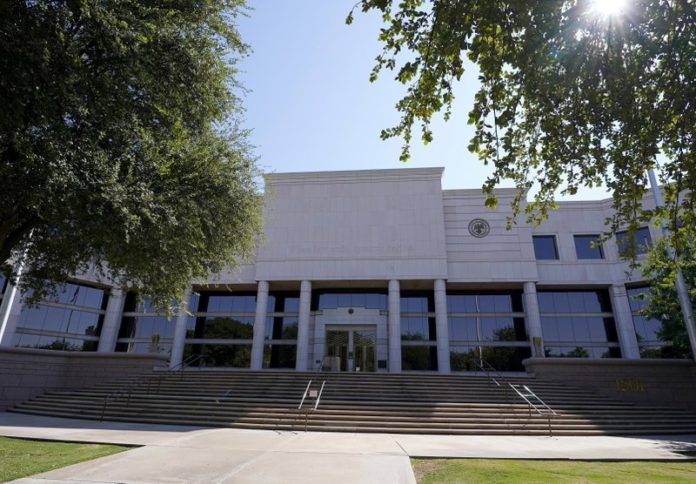
The Arizona Supreme Court cast doubt Tuesday on whether hundreds of millions of dollars in new taxes collected under a voter initiative enacted in November can be legally spent when a provision of the state constitution caps school spending.
The justices raised the questions during a hearing on an expedited constitutional challenge to the new voter-approved tax on high-earning Arizonans that was designed to boost school funding.
Opponents of the new tax focused on an exemption in Proposition 208 that gets around the school spending limit by calling the new revenue “grant” funding. But attorney Dominic Draye said that exemption just isn’t legal.
“Proposition 208 is a statutory initiative that needed to be a constitutional amendment,” Daye said. “It’s attempt to declare itself exempt from a portion of the constitution fails out of the gate when backers turned to the grant-gift exemption.”
Justice Bill Montgomery focused on that argument when he questioned a lawyer for the Invest in Education Act, which is expected to raise more than $800 million a year in new taxes. He noted that about $600 million of that new cash might not be able to be spent if the court says the grant exemption isn’t legal.
He noted that the Legislature had to seek a constitutional amendment to exempt a 2000 tax increase for education from the spending limit after the fact.
“I’m looking at the history that we have here and a previous effort to raise taxes for education and people realizing after the fact – oops – you can’t exempt a tax for education spending from the expenditure limit,” Montgomery told attorney Andy Gaona.
Gaona said there are multiple ways for the money to be spent, including the Legislature raising the spending limit, and urged justices to let the new law remain in force as voters intended.
“What it says is that additional funding is necessary,” Gaona said of the new law. “And there is no question that Prop 208, even if the expenditure cap applies, will raise additional funding for schools.”
Chief Justice Robert Brutinel questioned whether voters would have approved the measure if they knew much of the money could not be spent.
“Do you consider it rational to have a tax and spending scheme that puts hundreds of millions of dollars in an account and doesn’t provide a way to spend it?” Brutinel asked.
The court is being asked to declare Proposition 208 unconstitutional. They took the case under advisement and will issue a ruling later.
The Republican-controlled Legislature and a group of businesses brought the challenge and also questioned whether the new tax required a two-thirds vote in November’s election to pass, as tax increases imposed by the Legislature do.
Proponents of the Invest in Education Act, passed as Proposition 208 with nearly 52% of the vote, say voter initiatives clearly do not require a two-thirds majority to pass. And they say distributing the money through grants to schools is often used to avoid triggering the spending limit.
A trial court judge sided with the initiative’s proponents when refusing to issue a preliminary injunction blocking the tax in February.
Proposition 208 imposes a 3.5% tax surcharge on income above $250,000 for individuals or above $500,000 for couples. Supporters say it could raise about $940 million a year for schools, although the Legislature’s budget analysts estimate it will bring in $827 million a year.
The measure was an outgrowth of a 2018 teacher strike that resulted in educators getting a 20% pay raise over three years. But the state did not meet their other demands.
Republican Gov. Doug Ducey opposed the measure and told a business group last month that he’s hoping that either the state Supreme Court blocks the measure or the Legislature comes up with a way to sidestep the new tax.
There are multiple tracks the Legislature could take, and one that eliminates about a third of the estimated $827 million a year in new revenue has already passed the Senate. That measure, by GOP Sen. J.D. Mesnard, creates a new tax code section just for small businesses, setting the top tax rate at 4.5% but avoiding the new 3.5% surcharge.
Arizona small business income is currently taxed on personal tax returns. Opponents tried to persuade voters the new tax would hurt small businesses.
Republished with the permission of the Associated Press.













